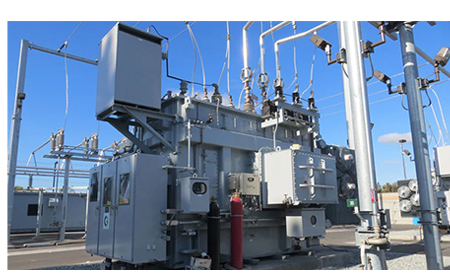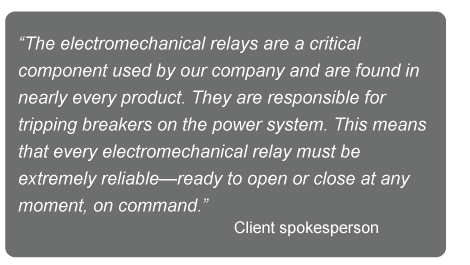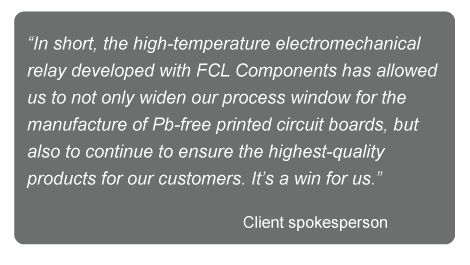Relays: Customer Case Story
Building a Better Power Relay
It’s been said that there is always room for improvement, no matter how good something is. For FCL Components, that “something” is the components it manufactures—including, but not limited to power (electromechanical) relays. The company actively works with its customers on developing or refining its components to suit their individual requirements. Case in point: FCL Components' move to support a long-standing manufacturing customer by pursuing improvements to the power relays it has been using in its products for about 20 years.

A Critical Component
The customer specializes in creating digital products and solutions that protect, control, and automate power systems—improving their functionality; preventing blackouts; speeding up power restoration; and supporting cybersecurity, automation, and communications. FCL Components' signal relays are used in the customer’s systems control communications platforms, while FCL Components' power relays are used in its electrical power systems control, monitoring, and management platforms “The electromechanical relays are a critical component used by our company and are found in nearly every product,” said a spokesperson for the customer. “They are responsible for tripping breakers on the power system. This means that every electromechanical relay must be extremely reliable—ready to open or close at any moment, on command.”Addressing Manufacturing Challenges Head-On
Several years ago, the customer began a manufacturing transition that involved a switch from SnPb (tin lead) soldering processes to Pb-free soldering processes. These new processes called for much higher solder wave temperatures and longer dwell times, causing the original relays to melt. The melting caused water ingress during the board-washing stage of production, resulting in product failures during dielectric testing.The customer turned to FCL Components to address these issues, working closely with its team to develop a new, improved high-temperature electromechanical relay. In addition to satisfying Pb-free processing requirements, the relay had to meet stringent electrical specifications set by the client. These requirements and specifications applied not only to product validation, but to system-level performance as well.

During the design process, the two companies collaborated to clearly define requirements and test specifications. FCL Components' "local in territory" manufacturer's representative, as well as its sales management and global engineering departments, supported the customer's research and development teams via traditional verbal and email communications, as well as through video calls and face-to-face engagements. At the same time, FCL Components continued to design, validate, and develop materials sources and piece parts to improve the overall performance of its relays. In addition to eliminating lead in its relays, the company found a way to stop using cadmium, which is now banned globally, in these components.
Each design iteration was tested extensively to ensure electrical and mechanical performance, process compatibility, and regulatory compliance for safety applications. Once the design was finalized, customer and FCL Components teams completed full design qualification processes, including regulatory testing with Underwriters Laboratories (UL), Verband der Elektrotechnik (VDE, a German institution that sets the standards for electrical and electronic tools, components, and installations and tests hundreds of thousands of tools annually), and others.
A Successful Transition…and Beyond
The customer recently incorporated the high-temperature electromechanical relay into several of its new products, paving the way for a successful initial transition to Pb-free processing across the board. It now has a wider range of manufacturing process abilities for all printed circuit board (PCB) assembly and has been able to eliminate some older, costly manual processes that involved the use of “leaded” piece parts. 
FCL Components representatives recently visited the customer’s campus to observe the new relay in the manufacturing process. The representatives also worked with the customer’s team on plans to utilize the relay in the entirety of its product lines that harness power relay technology.
“In short, the high-temperature electromechanical relay developed with FCL Components has allowed us to not only widen our process window for the manufacture of Pb-free printed circuit boards, but also to continue to ensure the highest-quality products for our customers,” the client spokesperson concluded. “It’s a win for us,” and for FCL Components as well.
